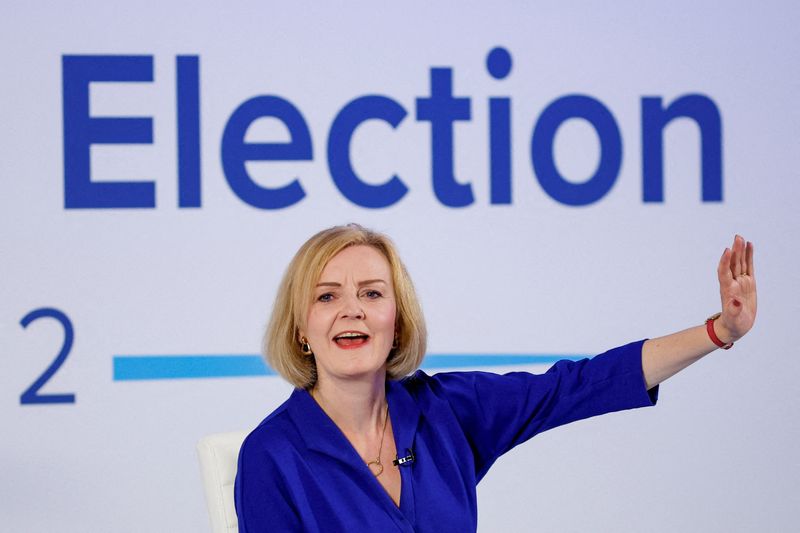By William Schomberg
LONDON (Reuters) - New British Prime Minister Liz Truss and her finance minister Kwasi Kwarteng look set to revive Margaret Thatcher's 1980s experiment in "trickle-down" low-tax economics, the results of which have been disputed ever since.
Truss cast herself as Thatcher's heir in the Conservative Party leadership race, promising tax cuts and taking aim at what she dismissed as a failed attempt over decades to use the wealth of top earners to help those on lower incomes.
She has denied there is any unfairness in her pledge to reverse a social security hike -- a move the Institute for Fiscal Studies think-tank says will hand back about 1,800 pounds ($2,083) a year to the top-earning households but under eight pounds to the poorest, in the middle of a cost-of-living crisis.
The priority, Truss says, is to give a growth shock to Britain's sluggish economy, which would help everyone.
"The economic debate for the past 20 years has been dominated by discussions about distribution," Truss said in an interview with BBC television on Sunday.
"But what's happened is we had relatively low growth so we've had no more than an average of 1% growth and that has been holding our country back."
By naming Kwarteng as chancellor of the exchequer, Truss has put an ally of her small-state vision at the helm of the world's fifth-biggest economy. A business minister under Boris Johnson, he is an admirer of Thatcher and wrote a book about her.
The former British prime minister, like former U.S. President Ronald Reagan, cut taxes in the 1980s. When Donald Trump was working on his own big tax cuts in 2017, the International Monetary Fund warned that such measures were aggravating inequality.
By turning the focus back to a smaller role for the public sector, Truss is sounding a different tone to Johnson whose signature policy was to "level up" Britain's poorer regions towards its wealthier ones via government policy.
UNCHAINED
Truss and Kwarteng co-authored another book published in 2012, Britannia Unchained, which lamented the loss of Britain's economic dynamism.
"A legacy of a bloated state, high taxes and excessive regulation threatens to take the drive out of the British economy," they wrote.
Truss and Kwarteng's first chance to spell out their vision will be in an emergency tax and spending budget plan which is likely to be announced later this month.
Both have railed against the size of Britain's post-pandemic tax burden, with tax revenues as a share of economic output set to hit the highest since the late 1940s in four years' time, according to the government's budget forecasters.
But that would still be lower than in Germany, Italy and France.
As well her plan to reverse the social security contributions increase, Truss has promised to halt next April's increase in corporation tax and to cut so-called green taxes on power bills.
Any plans she might have for deeper tax cuts could be limited by the huge cost of the support she is set to announce on Thursday to help households cope with the surge in gas and electricity bills caused by Russia's invasion of Ukraine.
Some financial analysts have put the cost of Truss' reported plan to freeze power tariffs at 100 billion pounds or higher, on top of her 30 billion pounds of tax cut promises.
A 130 billion-pound package would be equivalent to about a third of Britain's fiscal response to the coronavirus crisis that pushed debt to almost 100% of gross domestic product.
Kwarteng - aware of the alarm among investors who have heavily sold British bonds and pushed down the pound - has pledged that the new government will lower the debt-to-GDP ratio over time, but he also said this week that there was room for more borrowing now to kickstart the economy.
TAX CUT IMPACT
British media have reported that Truss is considering other tax cut measures including a big increase in the threshold at which earners start to pay the top rate of income tax, music to the ears of many in the Conservative Party.
"If you lower the upper rate of tax, businesses and individuals in that bracket are more likely to stay in the UK and are more likely to invest their money in the UK, and that's been the case for a long time now," Iain Duncan Smith, a former party leader, said.
Many researchers see it differently.
Stuart Adam, senior economist at the IFS think-tank, said the tax cuts promised by Truss and others that she is reportedly considering would generate some extra economic growth "but none of them are even close to paying for themselves."
With Britain's hospitals, schools and other public services already under heavy strain, the gamble by Truss that she can rely on the bond markets now to fund higher growth and stronger tax revenues in future looks like a big one.

"In the short run they can pay for it by borrowing but they can't do that forever," Adam said. "In the long run, the government will have to pay for cutting taxes by raising taxes elsewhere or cutting spending."
($1 = 0.8641 pounds)